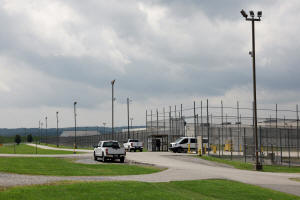Biden vowed to reform immigration detention. Instead, private prisons
benefited
 Send a link to a friend
Send a link to a friend
 [August 07, 2023]
By Ted Hesson, Mica Rosenberg and Kristina Cooke [August 07, 2023]
By Ted Hesson, Mica Rosenberg and Kristina Cooke
PHILIPSBURG, Pennsylvania (Reuters) - As a presidential candidate in
2020, Joe Biden pledged to end for-profit immigration detention, saying:
"No business should profit from the suffering of desperate people
fleeing violence."
The opportunity for action came early in the Democratic president's
term, in May 2021, when a group of senior immigration officials launched
an internal review of detention centers to decide which should be scaled
back, reformed or closed.
The review, which has not been previously reported, followed years of
complaints from government watchdogs, detainees and advocates about poor
medical care and sanitation, a lack of access to lawyers, sexual assault
and detainee deaths.
Months later, the group shared findings with Homeland Security Secretary
Alejandro Mayorkas, highlighting around two dozen U.S. Immigration and
Customs Enforcement (ICE) detention centers and recommending some be
closed, according to five current and former officials, who requested
anonymity to discuss internal government deliberations.
Reuters could not confirm which centers were recommended to be shut
down.
But, as illegal crossings reached record highs at the U.S.-Mexico border
- putting pressure on Biden officials to keep detention space available
- they only announced the closure of one facility in March 2022.
The stalled reform coincided with a boom in private prison revenues from
ICE contracts during the Biden administration and an increase in the
percentage of detainees being held in private facilities, according to
an analysis of ICE data by the American Civil Liberties Union (ACLU)
shared exclusively with Reuters.

Some officials argue private facilities can be better than local jails
that contract with ICE. Companies say they provide crucial flexibility
and adhere to ICE standards.
As Biden gears up to seek re-election in 2024 - and a possible rematch
against his Republican predecessor Donald Trump - immigration remains a
political flashpoint. Advocates and some Democrats have criticized Biden
for not going far enough to reverse hardline Trump policies and adopting
some restrictive measures. At the same time, Republicans have lambasted
Biden as too lenient.
While the review sought to close or reform troubled centers, the White
House and Mayorkas wanted to preserve detention beds and were concerned
with backlash in counties that benefited economically from the detention
centers, three of the officials said.
The Biden administration shuttered or reduced use of some of the most
criticized lockups, but it seemed like "the barest minimum" compared to
what was initially envisioned by the group that conducted the review,
one of the officials said.
A White House spokesperson said Biden "continues to support moving away
from the use of private detention facilities in the immigration
detention system."
ICE regularly reviews detention operations "to ensure non-citizens are
treated humanely, protected from harm, provided appropriate medical and
mental health care, and receive the rights and protections to which they
are entitled," a U.S. Department of Homeland Security spokesperson said.
One facility evaluated as part of the Biden administration review was
Stewart Detention Center, a Georgia lockup operated by the private
prison company CoreCivic.
Eight Stewart detainees have died since 2017, the most of any center. A
complaint filed in 2022 on behalf of four women alleged that they were
sexually assaulted by a male nurse in the facility.
Ryan Gustin, a CoreCivic spokesperson, said the safety and well-being of
detainees was the company's "top priority" and that the employee in
question was on administrative leave as ICE and Georgia authorities
investigate.
The Biden administration also looked at, but declined to close, several
centers that were part of a Trump-era expansion in Louisiana and
Mississippi, two of the officials said.
The facilities included Winn Correctional Center, a Louisiana detention
run by LaSalle Corrections. A government watchdog recommended in 2021
that Winn "be closed or drawn down until several critical health and
safety concerns could be addressed."
While the Biden administration said in 2022 it would limit the use of
Winn, the center currently houses 1,100 detainees.
Richwood Correctional Center, also run by LaSalle in Louisiana, was
called out in a government report this year for a lack of critical
translation services.

Ruben Dario, an Argentine who was detained at Richwood for eight months
in 2022, said he needed to serve as an ad-hoc translator for a Mexican
man on the verge of a stroke because staff didn't speak Spanish.
"If you don't know what they are asking you, you won't know how to
answer, either," he said.
Ryan Horvath, a spokesperson for LaSalle, said the company offered the
federal government increased capacity and specialized services. Richwood
had at least 14 Spanish-speaking employees last year and translation
tools, he added.
BIDEN LEANS INTO PRIVATE DETENTION
ICE detainees include people who recently crossed the border, as well as
those living in the country illegally, including asylum seekers. Many
are fighting court cases to avoid deportation.
While the numbers of detainees dropped during the pandemic, in part due
to lawsuits by rights groups, populations are rising again.
More than 90% of the roughly 31,000 people being held by ICE on average
in July were in private facilities, up from 80% at the end of the Trump
administration, according to the ACLU analysis.
[to top of second column]
|

A detainee transport van exits the
Moshannon Valley Processing Center, a former prison repurposed as an
immigration detention facility operated by the GEO Group under
contract with the U.S. Immigration and Customs Enforcement, in
Philipsburg, Pennsylvania, U.S. July 27, 2023. REUTERS/Quinn
Glabicki

Under Biden, private prison company GEO Group saw its revenues from
ICE contracts for detention centers and remote monitoring of
immigrants jump to a record $1.05 billion in 2022, up nearly 40%
from the previous year, corporate filings show.
CoreCivic, GEO's biggest competitor, also sustained high revenues
from ICE during Biden's term, according to corporate filings.
Under a new Biden asylum policy that went into effect on May 11,
more migrants encountered at the U.S.-Mexico border are being sent
to detention centers for rapid asylum screenings. Nine centers are
focused on the screenings, two officials said. All are privately
run.
By mid-July, two months into the new policy, the number of people in
ICE custody had jumped by 48% compared to the beginning of the year,
according to ICE data.
The administration has scaled back immigration detention in some
ways. During Biden's first months in office, before the detention
review formally began, ICE shuttered two much-criticized facilities.
The agency also stopped family detention by early 2022 and
significantly increased the number of people released with
electronic monitoring while they await their immigration court
hearings.
A White House spokesperson highlighted the use of detention
alternatives and said they "could be making a lot more progress" if
Congress would provide more funding and enact reforms.
GEO Group subsidiary BI Incorporated manages one of the monitoring
programs and GEO's chief operating officer told investors in
February that the number of people under remote supervision peaked
at more than 300,000 at one point last year. The monitoring program
predominately drove GEO's revenue growth from ICE, a company
spokesperson said.
In April, GEO's chief executive Jose Gordo told investors of
"potential opportunities for upside" for the company, including
"increases in populations at our ICE facilities."
ICE often pays to maintain a fixed number of beds at detention
centers regardless of whether they are actually used.
Adelanto ICE Processing Center, a GEO Group-run lockup in
California, currently houses only 16 detainees due to a
COVID-related court order despite paying to maintain a minimum of
640 beds in 2023.
A PRISON REPURPOSED
In March 2021, following a Biden executive order to phase out the
use of private prisons for federal detainees, a remote prison in
central Pennsylvania run by GEO Group shut down. But just six months
later, the company signed a contract to reopen the same complex as a
1,900-bed immigration detention center.
Angela Kelley, a senior adviser to Mayorkas at the time, said
officials were aware that opening a new privately run detention
center could appear hypocritical.
"It wasn't as if people forgot about the fact that the president
made this commitment," said Kelley, who now works with an
immigration lawyers association. "Once you're in the chair making
these decisions, executing on the promises is a lot different."

Now called the Moshannon Valley Processing Center, razor wire has
been removed from the fences and staff do not carry deadly weapons.
Detainees are called "residents" and guards are "resident advisers."
Other things, however, have stayed the same. Some 80% of prison
staff transitioned to the detention center, a GEO Group supervisor
said during a tour with Reuters. Visitors pass through secure
checkpoints and detainees are not permitted to move freely. There
are cells for solitary confinement.
Sunny Boy Sonkarlay, a Liberian immigrant, was detained at Moshannon
for 14 months until he was released in July, according to his
attorney and court documents.
The 28-year-old alleged guards slammed doors in his face and
unfairly placed him in solitary confinement on several occasions,
leading him to attempt suicide, an incident documented in his
medical records and a civil rights complaint.
"I tried to hang myself because I just couldn't take it," he said.
GEO did not comment directly on Sonkarlay's complaints but said it
strives to treat everyone in their facilities "with dignity and
respect." It added it invested approximately $4 million to make
improvements at Moshannon.
At a November 2021 county meeting to discuss the Moshannon
transition to a detention center, one GEO employee talked about
crying in her car when she heard the prison would close, saying "it
was devastating" thinking about people losing their livelihoods.
Then Erika Guadalupe Nunez, executive director of a
Philadelphia-based immigrant organization, stood up to speak.

"I have heard the opening of Moshannon Valley being described as
something that will provide jobs for the community, and that is how
it is being sold to you," she said. "Your livelihood should not
depend on the imprisonment of others. This community deserves
better."
(Reporting by Ted Hesson in Philipsburg and Washington, Mica
Rosenberg in New York, and Kristina Cooke; Editing by Aurora Ellis)
[© 2023 Thomson Reuters. All rights
reserved.]This material may not be published,
broadcast, rewritten or redistributed.
Thompson Reuters is solely responsible for this content. |